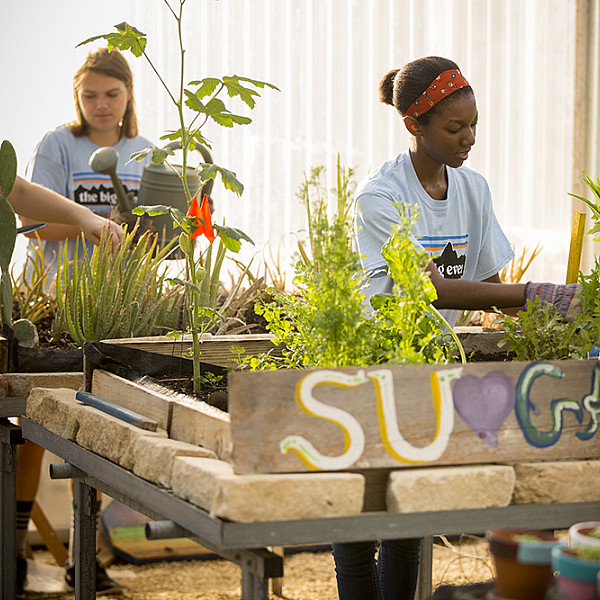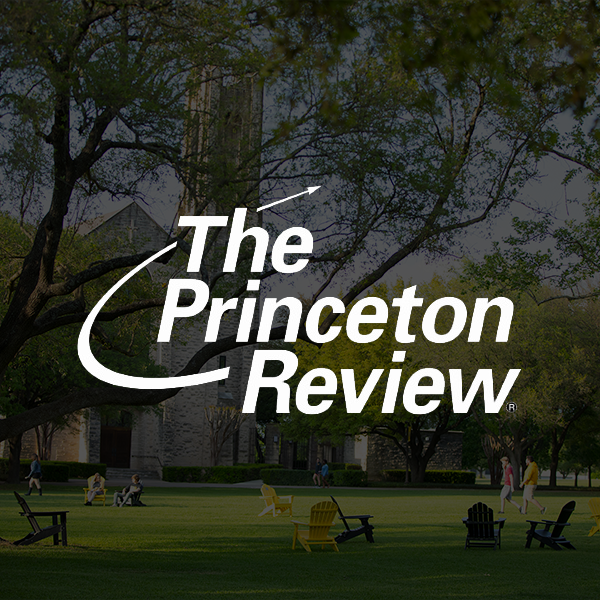News
Southwestern Featured in the 2018 Edition of the The Princeton Review Guide To 399 Green Colleges
October 23, 2018
October 23, 2018
Open gallery

Southwestern University is one of the 399 most environmentally responsible colleges, according to The Princeton Review. The education services company—known for its test prep and tutoring services, books, and college rankings—recognizes SU in the 2018 edition of its free book The Princeton Review Guide to 399 Green Colleges.
The Princeton Review chose the schools for this ninth annual edition of its “green guide,” which was published on October 16, based on data from the company’s 2017–2018 survey of 648 four-year colleges concerning the schools’ commitments to the environment and sustainability. The survey asked college administrators to report on their schools’ sustainability-related policies, practices, and programs. More than 25 data points were weighted in the tallies for the “green rating score” on a scale of 60 to 99. Colleges with green rating scores of 80 or higher made it into this year’s guide; The Princeton Review assigned SU a green rating of 88.
The Princeton Review attributes Southwestern’s green rating to such criteria as having a formal sustainability committee, offering a sustainability-focused degree, and providing transportation options such as the Pirate Bike Share Program and offering reduced parking fees for car and van poolers. In terms of academics, the company writes, “Students looking to make a positive change for the planet can get a head start with Southwestern’s environmental studies program, an interdisciplinary major or minor that explores the interactions of humans and the environment as well as the impacts of these interactions.” The Princeton Review further recommends SU’s Environmental Fellows Study Abroad Program, which provides students up to $5,000 for engaging in sustainability-related experiences in such locations as Costa Rica, Kenya, and Australia.
The profile further notes measures taken by the University to champion green living: “Southwestern is also the second university in Texas to sign the Talloires Declaration, which calls upon the school to engage in sustainable practices like a computer-based effluent water irrigation system, low-volume shower heads, and LEED certification on all new construction projects.” The Princeton Review acknowledges SU’s commitment “to providing as much locally sourced food as possible, reducing greenhouse-gas emissions, and minimizing food waste, which is the single largest contributor to landfills.” The University’s citation goes on to recognize Students for Environmental Action and Knowledge (SEAK) for maintaining a strong social-media presence and striving to promote environmentally sound practices on campus while raising awareness of sustainability issues.
“We strongly recommend Southwestern University and the other fine colleges in this guide to the many environmentally minded students who seek to study and live at green colleges,” said The Princeton Review’s Editor-in-Chief Robert Franek.
Franek noted that college applicants and their parents are increasingly concerned about the environment and sustainability issues. Among the nearly 11,000 teens and parents The Princeton Review surveyed earlier this year for its 2018 College Hopes and Worries Survey, 63% overall said having information about a college’s commitment to the environment would influence their decision to apply to or attend the school.
The profiles in The Princeton Review’s Guide to 399 Green Colleges provide information about each school’s admission requirements, cost and financial aid, and student body stats. They also include “green facts” about the schools, with details on the availability of transportation alternatives at each university and the percentage of each school’s food budgets spent on local or organic food.
The Princeton Review first published this guide in 2010. It remains the only free, annually updated downloadable guide to green colleges. The company is also known for its dozens of categories of college rankings in its annual books, The Best 384 Colleges and Best Value Colleges.
















